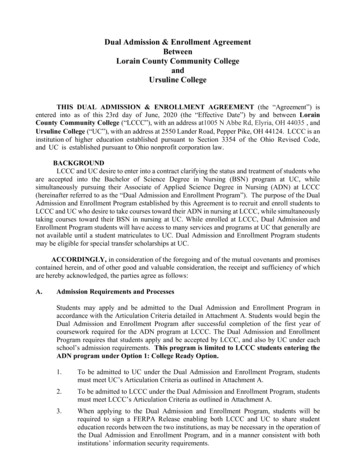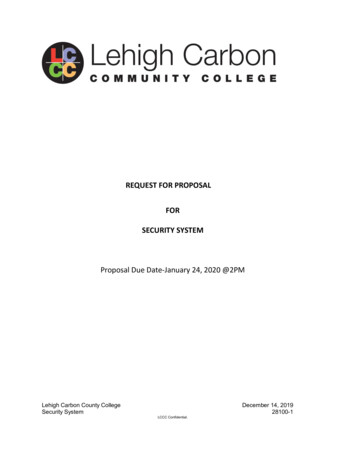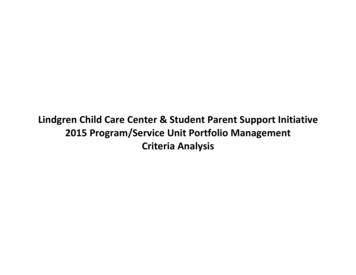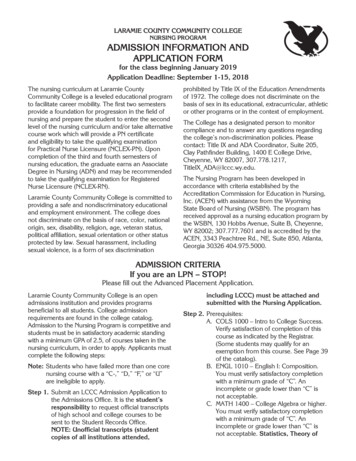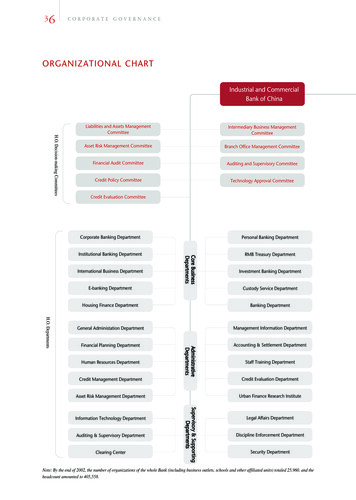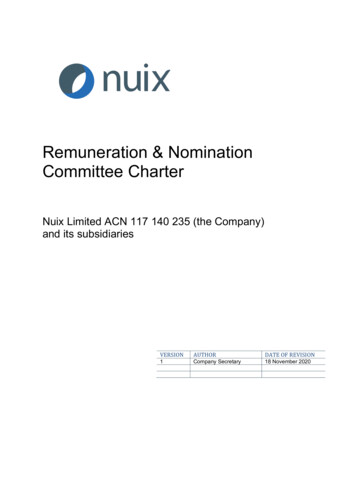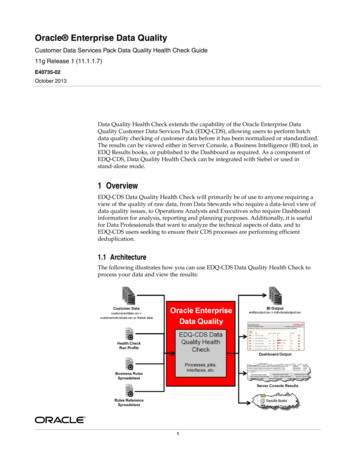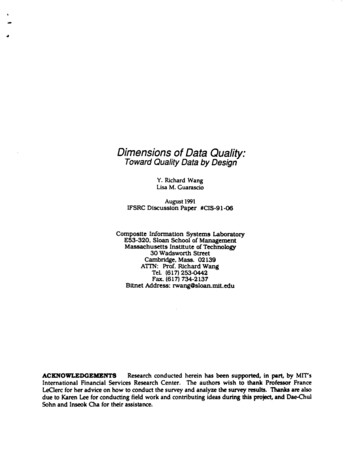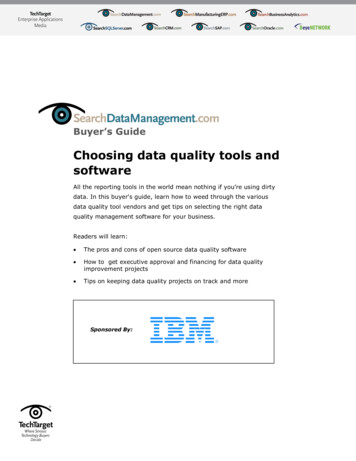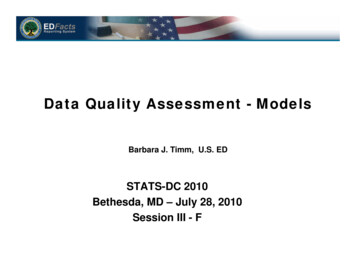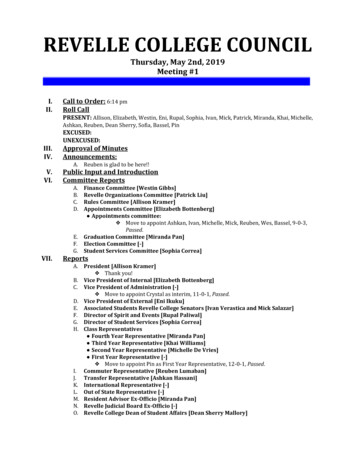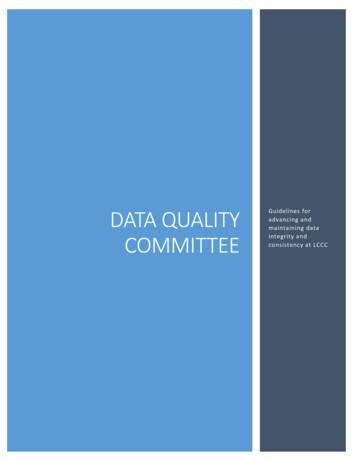
Transcription
DATA QUALITYCOMMITTEEGuidelines foradvancing andmaintaining dataintegrity andconsistency at LCCC
Background & PurposeThe Data Quality Committee (DSC) at Laramie County Community College (LCCC) was created inresponse to the state Executive Council identifying the need to ensure data integrity and standardizationat every community college in the state of Wyoming. Formed in February 2014, DSC provides a meansof communication between all staff who enter, use, or maintain LCCC’s data on a regular basis.The LCCC Data Quality Committee is responsible for creating, implementing, and maintaining datastandards at the institutional level and resolving institutional-level data integrity challenges to ensurethe highest possible level of institutional data quality, accuracy, and consistency for reliable internal andexternal reporting.Specifically, the Committee was established to:1. Align LCCC data with statewide common coding standards from the Wyoming CommunityCollege Commission (WCCC) and the Data Governance/Institutional Research Council (DGIRC) tosupport statewide data integration and standard reporting efforts.2. Emphasize the integrated nature of Ellucian Colleague, the designated Enterprise ResourcePlanning (ERP) system, across the entirety of LCCC and the importance of this integration’simpact on statewide and external reporting.3. Create data standards and communicate college-wide the need for established procedures toensure high-quality, reliable, and consistent data.4. Build and maintain communication channels between any staff who enter, revise, use, and/orreport LCCC data.5. Serve as the point of reference for information regarding LCCC data standards and guidelines.The Committee strives to prevent and resolve problems with LCCC’s data by providing guidelines thatengender the consistent use of data standards and making college-wide decisions in a collaborative way.To meet this mission, the Committee aims to: Communicate college-level data entry standards to facilitate consistent data use in an efficient,professional, and cost-effective manner.Share effective processing discoveries and problem-resolution scenarios.To meet these goals, the Committee has developed the guidelines below, which serve the followingpurposes: To provide the documentation necessary to establish and maintain data standards.To define the responsibilities of users who manage LCCC data.Offices may have individual guidelines and procedural documents that supplement, but do not supplantor contradict, these guidelines.Data Standards and PrinciplesThe Data Quality Committee abides by the following principles to maintain a standard level of dataquality and integrity across all LCCC campuses:Revised 5/10/20171 of 8
1. Decisions about data standards and where data resides are primarily driven by Ellucian’sColleague Applications and secondarily by the Data Stewards for each application, who have theresponsibility to ensure consistency and integrity of the institution’s data and to follow bestpractices.2. Colleague is the only designated ERP system for the institution; therefore, these guidelinesmust be observed to ensure the integrity of Colleague data and preserve the institution’sinvestment in Colleague.3. Data Quality Committee will not duplicate or override existing institutional policies regardinginstitutional data. Where gaps are perceived to exist, the Data Quality Committee may proposechanges to the appropriate personnel.4. The Data Quality Committee recognizes and abides by all federal requirements regarding datasecurity and privacy, including but not limited to FERPA, HIPAA, etc.Data Change ProcessBecause of the increasing standardization and the integrated nature of Colleague, many groupsboth internal and external to LCCC need to be aware of any changes to LCCC data values. Tomeet this communication need, the flowchart below has been designed for guiding the datachange process. This flowchart will be used primarily by data stewards and DSC members whenany of the following scenarios are identified to guide the data change process. Any possibledata changes identified by technical users can be communicated to the appropriate datasteward for investigation: changing data values for fields currently in useusing data fields that have not been previously populated, including miscellaneousfieldsusing a data field for other than its intended purposeeliminating the use of a data fieldimplementing new ruleschanging field names as a result of job or subroutine updateschanging business processes that impact Colleague datachanging val-code tablesadding computed columnsadding new subroutineseliminating or adding forms during a software updateidentifying codes whose meanings may have changed over timeRevised 5/10/20172 of 8
To expedite the data change process, email communication can be used so all groups involvedin the process can be notified of the data change request simultaneously. These email trails inaddition to DSC and the Colleague Users’ Group (CUG) meeting notes are necessarydocumentation for any data changes that are made. This documentation is maintained on theEaglesEye Data Quality Committee community group pages.When a data change recommendation is made, the following information needs to bedescribed when communicating with the groups identified in the flowchart: the data field in question and current practice surrounding this fieldthe problem being caused by the current practicethe recommended change and how this change is expected to resolve the problemthe implementation timelineIn response, the groups consider how this change may impact their areas and provideconstructive feedback if the change may adversely impact their areas. This collaborativeprocess is intended to allow all stakeholders to develop the most effective solutions to datachallenges to improve data quality and communication at LCCC and not to hinder necessaryoperational processes. When a change is approved, each area’s representative is responsiblefor communicating the change to their areas. Additionally, the change is documented onEaglesEye in the Data Quality Committee community group and emailed to all DSC and CUGmembers. Communication of the change is required prior to the implementation date.Statements of Membership and ResponsibilityThe responsibility for the maintenance of and compliance with data standards is determined based on auser’s relationship with the data. The roles of Data Quality Committee members include: Approving new, updated, or edited codes for institutional dataEditing the Data Quality Committee guidelinesManaging any data responsibility and accountability issues between departmentsResolving compliance issues with policy and procedure as these relate to shared data standardsCommunicating major changes to shared data standards which affect the college community,especially changes that come from state- and national-level groupsEstablishing guidelines for audit and compliance of shared data standardsMembers are included because they are either a data steward (or designee) or a state-levelrepresentative. Ex-officio members play a vital role in the utilization or understanding of Colleague dataand can provide useful information to data standard discussions. A member may be responsible formore than one role.Revised 5/10/20173 of 8
Data Steward (or designee) responsibilities include: Defining how data originating in their area is used across the institution Interpreting legal compliance Overseeing and monitoring data entry and maintenance Establishing systems standards in coordination with Functional Managers and IT Creating, implementing, and maintaining procedures and training Acting as a decision-making authority on the committeeState-level representative responsibilities include: Representing their respective state-level council/committee Communicating information to LCCC personnel regarding state-level data requirements Acting as a decision-making authority on the committeeEx-Officio responsibilities include: Providing important information critical for data stewards and state-level representatives tomake decisions regarding data standardization rules and practices Acting in an advisory capacity on the committeeMembers of the Data Standards Oversight Committee are listed below with their membership role:TitleAdministrative Assistant, VPAAAssistant to the DirectorBusiness AnalystChief Technology OfficerData AnalystDatabase Administrator, SQLDirectorDirectorCollege Department/DivisionAcademic AffairsAccounting Services/Admin &FinanceStudent ServicesIT/Institutional EffectivenessIR/Institutional EffectivenessIT/Institutional EffectivenessFinancial Aid/Student ServicesIR/Institutional EffectivenessInformation SpecialistHuman ResourcesProgram ManagerFacilities & Events/Outreach &WorkforceIT/Institutional EffectivenessProject & Application SupportManagerRegistrarResearch AnalystStudent Records/StudentServicesIR/Institutional EffectivenessMembership RoleData Steward, ST-CU, ST-FIData Steward Designee, ST-AR,CF, HR-PayrollEx-OfficioCIO Council RepresentativeEx-OfficioEx-OfficioData Steward, ST-FAState IR & Data GovernanceRepresentativeData Steward, HR (except forPayroll), COREData Steward, CORE-Locations,buildingsSystem Manager, Colleague;State Colleague AdministratorsRepresentativeData Steward, ST, COREEx-OfficioAdditionally, the following table shows functional group representatives in the state’s data governancestructure. These functional group representatives represent Laramie County Community College ontheir respective functional groups at the state level for recommending data standardization rules andbest practices to the Institutional Research and Data Governance Council.Revised 5/10/20174 of 8
LCCC Colleague Functional Group RepresentativesColleague Module Functional Group CommitteeFunctional Group RepresentativeCOREDirector, Institutional ResearchFinancialsAssistant to the Director, Accounting ServicesHuman Resources*Information Specialist, Human ResourcesStudents, Financial AidDirector, Financial AidStudents, Registration and RecordsRegistrar, Student Records*Due to internal LCCC structure, any payroll related information that is discussed at HR functional groupmeetings needs to be forwarded to the Assistant to the Director, Accounting Services.Functional Managers and 3rd Party Software ApplicationsA Functional Manager is an LCCC employee who is responsible for managing the implementation anduse of a Colleague module or 3rd party software application. Data Stewards may be FunctionalManagers, but not all Functional Managers are necessarily Data Stewards. The roles of the FunctionalManagers are collaborative in nature and are stronger when systems change. Their roles include: Collaborating with the Data Steward to identify the data required to implement and/or usewithin Colleague or 3rd party software applicationsCommunicating with IT to receive necessary assistance for functional needs of the applicationRecommending how data are entered and defined within the software applicationEnsuring the proper configuration of the 3rd party software applicationEstablishing systems standards in coordination with Data StewardsEnsuring testing of Colleague updates as well as testing of integration between Colleague and 3rdparty software applicationsActing as liaison between all involved personnel, including Colleague and 3rd party softwareapplication users, Data Stewards, and 3rd party software application providersLCCC has implemented several 3rd party software applications that require various levels of Colleaguesourced data provision. Since the date in Colleague is the source of record, all software applicationsmust derive their data from Colleague. This practice ensures accurate reporting, data feed imports,query reports generated from SAP Business Objects, and other methods.When a 3rd party software application is considered for implementation, the following diagram can beused to initiate communication processes.Revised 5/10/20175 of 8
3rd Party Software Application Communication and Responsibilities ModelExecutive Sponsor (President’s Cabinet member)-Responsible for all implemented applications in their area.-Designates at least one employee to fulfill the Functional Manager’s roles for a specific applicationor Colleague module.-Multiple responsibilities may exist for the same person.-Involves all employees mentioned below when deciding to implement an application. Prior toimplementation, this collaborative team recommends whether the application implementation ispossible and necessary.Functional Managerfor specific 3rd partysoftware application-Responsible for thegiven application.Relationship: The FunctionalManagers and IT are required tocollaborate to ensure properimplementation and resources.Colleague ModuleFunctional Manager-Responsible for thegiven ColleagueModule.IT Support-Collaborates with the functionalmanager(s) to correctlyimplement the new technology.The tables in Appendix B show the Functional Manager for each of the 3rd party software applicationsimplemented at LCCC and describes the data transmittal direction between Colleague and each 3rd partysoftware application.Revised 5/10/20176 of 8
AppendicesA. Additional ResourcesNote: Many of these resources are being developed. They will be posted to the Data Quality CommitteeEaglesEye community as they become available.Statewide Data Common Coding Dictionary (link)[State documents – pending]Ellucian resources (manuals, communities, online help documents, etc.)State Functional Groups and Their MembershipsData dictionaries being developed by state functional groupsState level flowcharts for data changes and standardization processesB. 3rd Party Software Applications and Functional Manager Assignments3rd Party Software Applications Using Data From ColleagueApplicationFunctional ManagerBookstore Faculty PortalManager, LCCC BookstoreBOSSOutreach Coordinator, GEAR UP*Campus ClarityVP, Student ServicesCampus Labs, Course evaluationsIR Data AnalystCollegeNet 25Live/R25Facilities & Events Program ManagerCollegiate LinkProgram Manager, Student Activities &Multicultural EngagementCurricUNETAdministrative Assistant, Academic AffairsDesire to Learn (“D2L”)Director, Center for Academic TechnologiesEllucian MobileWeb Designer, ITSMaxientDean of Students, Student LifePerceptive Software (“ImageNow”)Registrar; Director, Financial AidRAVEPublic RelationsSAP Business Objects (“CROA”)Director, IR (?)StarfishDirector, Student Planning & SuccessSTARsAssistant Director, Financial AidTutorTracAdministrative Assistant, Ludden LibraryUMRADirector, Systems & Technology SupportRevised 5/10/20177 of 8
3rd Party Software Applications Using Data From AND Sending Data to ColleagueApplicationFunctional ManagerCampus Cruiser (“EaglesEye”)Web DesignerCOD: Common Origination and Disbursement (for Director, Financial Aidthe Dept. of Ed)FA LinkBookstore; Supervisor, Accounting & PayrollServices; Director, Financial AidNational Student ClearinghouseRegistrarNelnetSupervisor, Accounting & Payroll ServicesRecruiterDirector, AdmissionsTDClientDirector, Financial AidTimeClock Plus*Director, Accounting Services*Data is downloaded directly to Colleague.Individual-Level Data Reports Delivered to External Agencies from ColleagueReportExternal AgencyFunctional Manager1098-TACSDirector, Accounting ServicesPayroll ACH payments,American National BankDirector, Accounting ServicesListing of checksPositive PayG5 ReportsDepartment of EducationDirector, Accounting ServicesGainful Employment ProgramDepartment of EducationDirector, Institutional ResearchReportingOperational Data StoresWyoming Community CollegeDatabase AdministratorCommissionReports for Accounting/PayrollState of WyomingLead Technician, PayrollRevised 5/10/20178 of 8
LCCC has implemented several 3rd party software applications that require various levels of Colleague-sourced data provision. Since the date in Colleague is the source of record, all software applications must derive their data from Colleague. This practice ensures accurate reporting, data feed imports,
